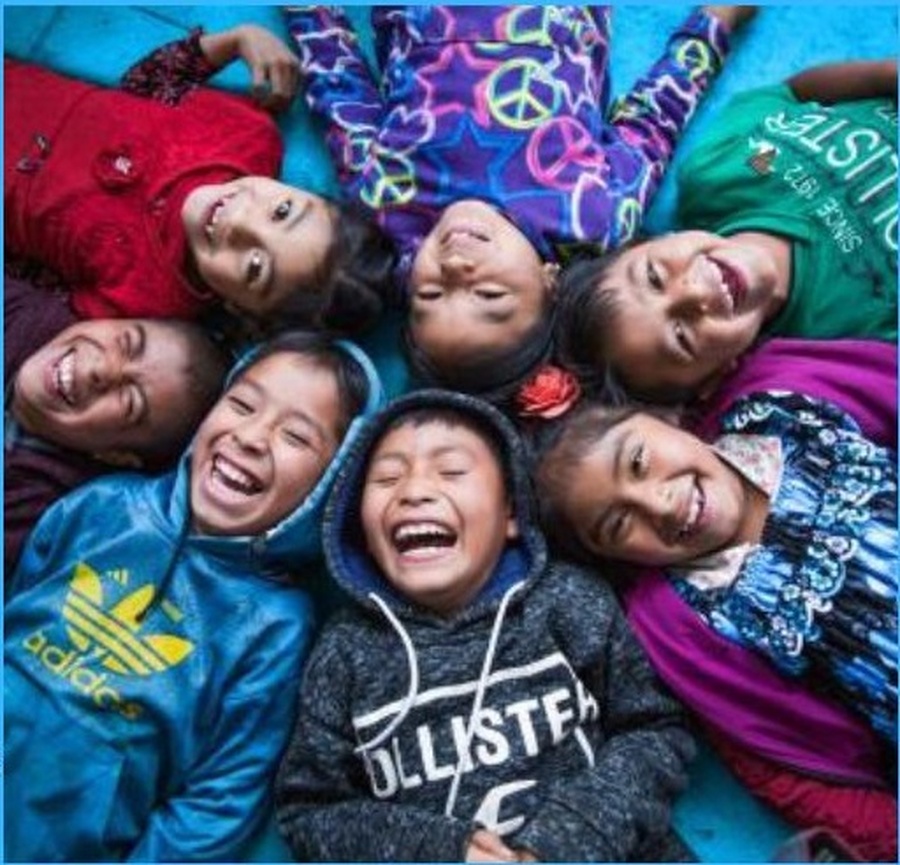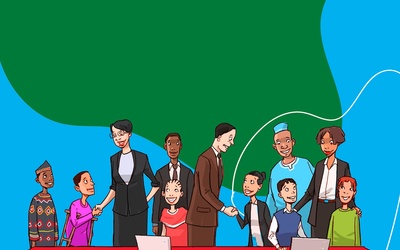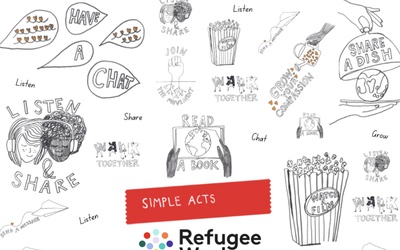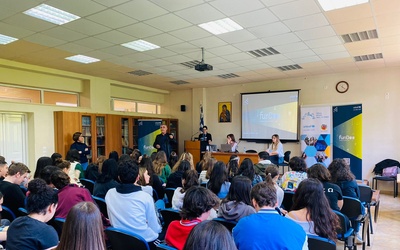The poll was carried out by UNICEF in collaboration with the Ministry of Justice, with the aim of researching the opinions and suggestions of children and young people about the new National Action Plan for the Rights of the Child. The National Action Plan covers the period 2024-2027, is a comprehensive strategy for the protection of the rights of the child and includes horizontal actions by the bodies that make up the National Mechanism.
331 U-Reporters participated in the poll. Most of the respondents (58%) were between 15-18 years old, while 24% belonged to the age group up to 14 years and 18% 19-24 years. Girls participated more actively, representing more than half (69%) of respondents. In addition, 18% were young refugees and migrants living in Greece. The region from which most participants came was Attica, followed by Central Macedonia, Thessaly, and Epirus.
According to the results, almost half of U-Reporters (46%) do not know what the National Action Plan (NAP) is for the Rights of the Child, followed by 37% who are aware but wish to learn more, while only 16 % stated that they know what the ESA is.
Answering the question of which topic they consider most important to be included in the NAP, most respondents chose the protection of children from violence and abuse (13%), followed by ensuring children's right to education (12%), combating child poverty (12%) and ensuring the right to mental and physical health (11%). In addition, 30% of respondents were equally divided between choosing to ensure a safe and healthy family environment (10%), protecting and including children with disabilities (10%), and the need to take special protective measures for children who may be discriminated against (e.g. refugees and immigrants, Roma, LGBTI, etc.) (10%). 7% chose access to cultural activities, leisure, and entertainment opportunities, followed by the protection and access of children to the internet (7%) and the strengthening of children's participation in political and social life (6%).
When asked what is most important measure to combating child poverty, 36% chose supporting families in need by providing money, followed by providing food and necessities to families with low incomes (33%) and benefits for the improvement and upgrading of homes (31%). A 14-year-old U-Reporter from Larissa stated that it is also important to have 'professional training for parents, second-chance schools, capacity building actions necessary for the modern, globalized society, such as courses on the proper use of computers. Thus, the parents will not be constantly financially and materially dependent on the state but will be able to escape from unemployment or claim a more promising and promising position financially'.
Regarding children's access to cultural activities, leisure and entertainment opportunities, 33% consider access to artistic activities, free or at low cost, important, 27% access to social and cultural events (e.g. festivals, theater laboratories), 25% the operation of suitable playgrounds and sports facilities and 14% the operation of libraries and reading areas.
In addition, 48% consider training parents to cope with their role as parents the most important issue for a safe and healthy family environment. At the same time, 30% emphasize that it is important to find appropriate solutions for children who do not live with their families (e.g. finding other families either temporarily or permanently), while 22% mentioned supporting separated parents to ensure always the interests of the child. Other responses included the following suggestions: 'constant supervision of children's mental health by specialists, supervision of home conditions, training of parents, protection and removal of children from abusive parents' (U-Reporter, 24 Rethymnon), '[…] support for mothers who they are students, they cannot work and have no support' (U-Reporter, 20 Athens), '[…] parents understand and love their children, regardless of whether they are disabled or have a different sexuality' (U- Reporter, 15 Athens).
Regarding ensuring the right to mental and physical health, 43% emphasized the importance of ensuring access to health services, 22% reducing the cost of health services for children and young people and 16% children in need of special support (e.g. refugees, migrants through interpretation services, professional training) also have certain access to health services. The remaining respondents chose adequate information on reproductive and sexual health (9%), drug and alcohol prevention programs (6%), and childhood obesity prevention and treatment (4%). An 18-year-old U-Reporter from Eordaia also emphasized the importance of recognizing diversity, writing: 'From a very young age, a more tolerant and open mindset for different people must be cultivated, giving access to relevant literature and organizing various discussions with experts’.
Regarding the guarantee of children's right to education, the majority stated that the improvement of school facilities (29%) and the modernization of the curriculum (27%) are important elements. 11% mentioned the prevention and treatment of school bullying as important, while 10% psychosocial support in schools. The rest of the respondents chose support for the prevention of dropping out of education (8%), strengthening the participation of children in the school community (8%), and cultural activities at school (6%). A 16-year-old U-Reporter from Athens wrote specifically about additional teaching 'I wish not to need tutoring and additional courses to gain knowledge'.
Regarding the protection of children from violence and abuse, 29% cited supporting children and their families’ facing problems and related risks as important (e.g. mental health services, psychological support), while 22 % informed children about how they can protect themselves from similar incidents, i.e. where they can find information. This was followed by informing the children about where they can go to ask for help (e.g. the ways to report incidents to the official authorities) (16%). Raising awareness of society about abuse and violence (%12), educating children about their rights (10%) and psycho-social support for children who have experienced such incidents (9%) were rated as equally necessary factors.
According to U-Reporters, the most important factor that contributes to ensuring the social and political participation of children is informing and empowering them regarding the right and the way to participate (47%) at all levels (school, municipalities, central level). This is followed by the operation of mechanisms at the city/neighborhood level for the participation of children (youth councils, advisory groups, etc.) in political life (25%), the operation of mechanisms at the national level (15%) for the participation of children, and operation of applications or electronic platforms that facilitate the remote participation of children in civic life (12%).
When asked about the actions needed for the protection and inclusion of children with disabilities, 46% said that the most important issue is ensuring physical access to recreational areas and schools. 29% of participants emphasized the importance of raising awareness in wider society about the rights of people with disabilities and combating stereotypes. This is followed by the strengthening of support for children with disabilities or learning difficulties in the school environment (13%) and the strengthening of specialized support services for families that have a member with disabilities (12%).
Finally, choosing the most important element for
children's protection and access to the internet, developing digital skills
so that children can use the internet safely and make the most of its potential
emerged as the first preference (34%), followed by awareness and information about
the protection of children from the dangers of the internet (28%). Securing
access to fast internet for free or at low cost in schools, public places and
low-income families is almost at the same percentage of preference (25%). 13%
chose to provide adequate digital equipment for free or at a low cost to
students and schools.








